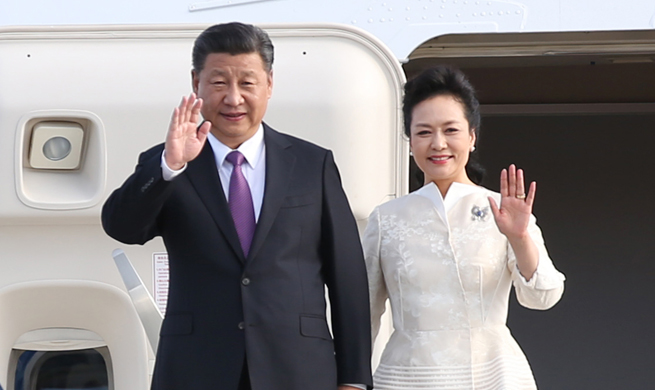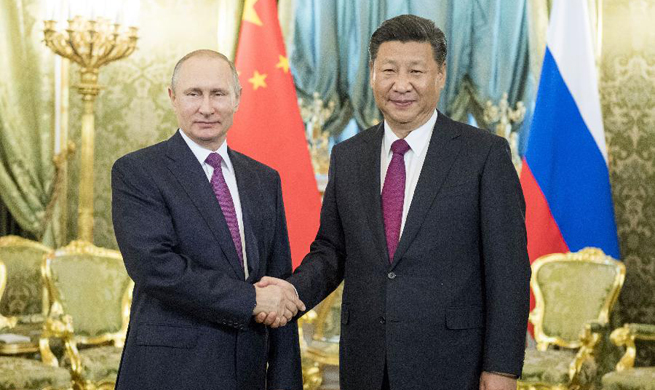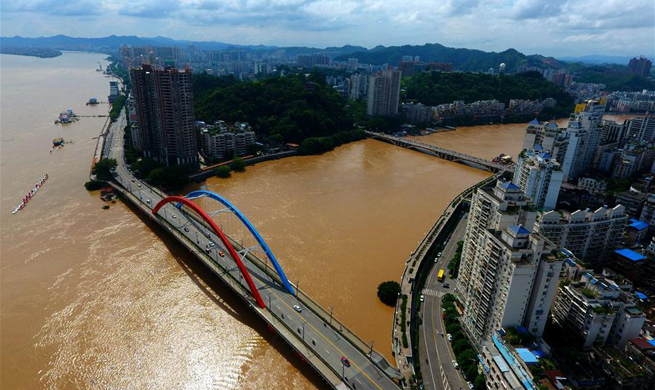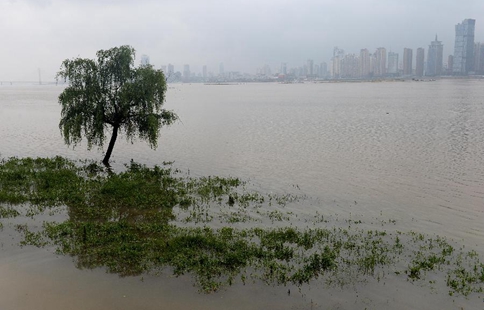ISTANBUL, July 5 (Xinhua) -- Following Turkey's deployment of troops around the Kurdish-held Afrin Canton in northwestern Syria, many feel a Turkish military operation is imminent, a sense augmented by reported withdrawal of most Russian troops from the canton.
Turkey has substantially increased the presence of its troops, tanks and artillery units around Afrin over the past two weeks, while most of the Russian troops retreated last week to areas controlled by the Syrian government, according to Turkish media reports.
The Russian withdrawal, though not officially confirmed yet, is widely seen as a tacit approval for a Turkish military move against the Kurdish militia controlling Afrin, known as the People's Protection Units (YPG).
"The discourse from Ankara and the substantial military buildup at the border point to an imminent operation targeting YPG-controlled Afrin," Faruk Logoglu, a retired diplomat who once held top posts at the Turkish Foreign Ministry, told Xinhua.
Erdogan Karakus, a former air force general in the Turkish military, takes the Russian retreat as a sign of an agreement between Ankara and Moscow.
"The Turkish military operation (against Afrin) is imminent," he said.
The operation is aimed at cleansing the area of the YPG, said Karakus, adding that YPG elements in Manbij should be targeted as well after Afrin.
Other than Afrin Canton, Manbij in northern Syria is the only YPG-held town situated on the west bank of the Euphrates River.
The Kurdish militia have carved out three autonomous cantons along the Turkish border during the Syrian civil war, a development that Ankara fears may lead to the emergence of an autonomous or independent Kurdish entity along its border and set a precedent for its own nearly 20 million Kurds.
Speaking on state-run TRT broadcaster on Tuesday, Turkey's Defense Minister Fikri Isik vowed not to "hesitate to stage an operation" to cope with security threats from both Afrin and Manbij.
A day earlier, government spokesman Numan Kurtulmus described the YPG in Afrin as a national security threat, implying that Ankara would not hesitate to counter any threats with a military offensive as it had done before.
Russia has understood well the threat against Turkey from Afrin as well as Ankara's sensitivity on the issue, the spokesman said, adding that Turkey and Russia have recently had positive talks.
Turkish President Recep Tayyip Erdogan had a phone conversation with his Russian counterpart Vladimir Putin at the end of last month and met on Sunday with Russian Defense Minister Sergei Shoygu in Istanbul, with the presence of Turkish Chief of General Staff Hulusi Akar and Hakan Fidan, head of the National Intelligence Organization.
Back in March when there was talk of a possible Turkish military intervention into Afrin, Russian troops appeared in the region all of a sudden in an apparent bid to deter any Turkish military action.
Russian flags were raised near the Turkish border at that time, while photos of Russian soldiers together with the YPG fighters appeared in the press.
Karakus believes that the change in the Russian attitude is mainly linked with two recent developments.
One is the blocking by the U.S. side of Syrian troops from gaining ground around Raqqa, a stronghold of the Islamic State that Washington and its allied YPG-dominated Syrian Democratic Forces are fighting hard to take back.
The other is the need for Russia to have Turkish support to take the city of Idlib under control under a recently-concluded cease-fire agreement aiming to end the Syrian war.
Idlib is currently under the control of radical Islamist rebels who were allowed last December to move to the city from Aleppo as part of negotiations brokered by Russia, Turkey and Iran.
Turkey is known to hold sway over the rebel groups in Idlib which had fought to topple the Syrian government, as Ankara supported the rebels in the Syrian war until it mended ties last summer with Russia, a staunch supporter of Damascus.
Based on the ongoing Syrian peace talks in Astana, Kazakhstan, Russian and Turkish troops are expected to jointly maintain order in Idlib, one of the four de-escalation zones created in May in efforts to end the bloody conflict.
"For Ankara, the argument for such an operation is two-fold: one is to fight the YPG as a terrorist organization and the other is to prevent the emergence of an independent Kurdish entity in the north of Syria," Logoglu said of Turkey's possible military move against Afrin.
Ankara sees the YPG as the Syrian offshoot of the Kurdistan Workers' Party (PKK) outlawed for its decades-old armed struggle for autonomy in Turkey's predominantly Kurdish southeast.
President Erdogan vowed on June 23, days after some reinforcements were sent to the border, that Turkey would not allow a terrorist state to emerge along its border with Syria.
According to reports in local media, the Afrin operation may be launched following the Astana talks and the G20 summit slated for July 7-8 in the German city of Hamburg.
Erdogan is scheduled to meet with Putin on the sidelines of the G20 summit.
Like many others, Yasar Yakis, a former Turkish foreign minister, feels Turkey has the right to block the establishment of an uninterrupted Kurdish corridor along its border.
Turkey should first, however, try to achieve this end through negotiations with both the YPG and the Syrian government to avoid casualties in a hostile environment, he argued.
"It will be up to the Syrians to decide the shape of post-crisis Syria, and Turkey's leverage at that stage is not unlimited," Yakis told Xinhua, noting that the area in question is Syrian territory.
The emergence of a Kurdish corridor along Turkey's southern border, which shall be de facto linked with the territory ruled by the Kurdistan Regional Government in neighboring Iraq, would physically cut off Turkey from the Arab world.
Turkish military units on the Syrian border fired late Monday rockets and artillery shots on YPG positions in Afrin in response to alleged firing from that region.
According to local media reports, fire went high up in the air and YPG vehicles, tanks and ammunitions were apparently hit.
The Free Syrian Army (FSA) rebels backed by Turkey will be part of the eventual Turkish operation, press reports said, as the group was when Ankara launched what it called Operation Euphrates Shield in August last year in northern Syria to push the Islamic State away from the Turkish border and prevent Afrin from uniting with two other Kurdish cantons on the eastern part of the Euphrates.
Once Turkey wades again militarily in Syria, it is also seeking to prevent PKK members on Turkey's Amanos Mountains in the Hatay province from using Afrin as a logistics center, as Hatay borders with the canton.
Since the collapse in 2015 of a peace process aimed at resolving Turkey's Kurdish issue, government and PKK forces have been engaged in fierce fighting.
The U.S. may be opposing any Turkish move against the YPG in Afrin, as it may well risk weakening the group's ongoing battle for Raqqa.
It is also widely argued that the Kurds may bear a resentment against Washington in the event of a Turkish intervention into Afrin.
Both the U.S. and Russia recognize the YPG as a legitimate actor in Syria. Despite repeated Turkish opposition, the U.S. opted to launch the offensive against Raqqa with the Kurdish fighters.
An operation against Afrin may aim to capture the whole canton or seize first only critical areas around the town of Afrin without targeting the town itself.
The Menagh air base and the village of Tal Rifaat are cited as among the strategic targets in Turkish media reports.
"My preference is for the Turkish army not to enter the Syrian territory at all," remarked Yakis. "If it enters, it should be limited as much as possible."
Logoglu feels that limiting the operation to driving away the YPG from near the Turkish border can be explained as combating a terrorist threat, while the other option may raise problems for Turkey.
He warned that a sustained military confrontation between Turkey and the YPG would not only widen the scope of Turkey's fight against the PKK at home, but may present Turkey with unwanted challenges, in particular from Washington.
According to media reports, the YPG is backing up its defense near the Turkish border with heavy weaponry.
The day President Erdogan talked on the phone with Putin, he also spoke to U.S. President Donald Trump. On the same day, Brett McGurk, U.S. special presidential envoy for the global coalition to counter the Islamic State, was in Ankara for talks with Foreign Ministry officials.
Mehmet Acet, a columnist close to the Turkish government, claimed on Monday in the Yeni Safak daily that he has the impression that Trump's demand to talk with Erdogan over the phone was aimed at preventing a Turkish move against Afrin.
"McGurk's sudden arrival in Ankara also seemed to be part of this effort," he wrote.

















